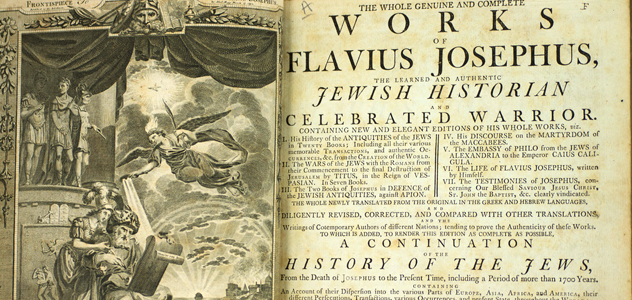One of the central questions of God Save the King is, “If Jesus wasn’t born on December 25th, when was he born?” Deciphering this riddle can be a challenge for reasons that we may not initially be aware of.
While it is clear that the ancients kept track of time and made use of calendars, it is equally clear that they did not have the same view of times and dates as we do. Obviously, they lacked the technology we possess today, but they also did not apply what knowledge they did have in the way we do either. One example is that while they would take the time to mention an important event, and the chronological relation to another event, they often did not record the dates of these important events.
One of the primary sources for God Save the King is the works of the Jewish historian Flavius Josephus. While the general information reported by Josephus appears to be accurate, he has come under fire as a historian because he was not necessarily precise, especially with chronological markers. But there may be a good reason for this—in the culture of the time, even among those we would recognize as “historians” who we would presume to know and record such things, he simply may not have known the precise dates of the events he describes.
An example of this that lies at the heart of the debate regarding when Jesus of Nazareth was born is his citing of a lunar eclipse that shortly preceded Herod’s death.
Now it happened that during the time of the High Priesthood of this Matthias, there was another person made High Priest for a single day; that very day which the Jews observed as a fast. The occasion was this: This Matthias the High Priest, on the night before that day, when the fast was to be celebrated, seemed, in a dream, to have conversation with his wife: and because he could not officiate himself on that account, Joseph, the son of Ellemus, his kinsman, assisted him in that sacred office. But Herod deprived this Matthias of the High Priesthood: and burnt the other Matthias, who had raised the sedition, with his companions, alive. And that very night there was an eclipse of the moon. [Josephus, Antiquities17.6.4]
When he had done these things, he died, the fifth day after he had caused Antipater to be slain: having reigned since he had procured Antigonus to be slain thirty-four years: but since he had been declared King by the Romans thirty-seven. [Josephus, Antiquities17.8.1]
Take note how the events themselves as well as the timing of the events are described (emphasis added) …
- “During the time of the High Priesthood of this Matthias.”
- “There was another person made High Priest for a single day.”
- “That very day which the Jews observed as a fast.”
- “On the night before that day, when the fast was to be celebrated.”
- “That very night there was an eclipse of the moon.”
- “When he had done these things, he died.”
- “The fifth day after he had caused Antipater to be slain.”
- “Having reigned since he had procured Antigonus to be slain thirty-four years.”
- “But since he had been declared King by the Romans thirty-seven.”
There is almost enough significant information that if we had just a few more pieces to work with, and more importantly, had a verifiable touchstone to work from, we could very well decipher exactly when certain events occurred. But notice the conspicuous absence of dates and precise information. I will not take the time to crunch the data other than a few quick examples, simply notice how lack of precision causes us as readers to want additional information.
“During the time of the High Priesthood of this Matthias.”—Okay great, but exactly when was “the time of the High Priesthood of Matthias”?
“That very day which the Jews observed as a fast.”—Again, great. But the Jews observe many fasts—which one?
“The fifth day after he had caused Antipater to be slain.”—Awesome! Five days after Antipater was slain, but when was Antipater slain?
Based upon Josephus’ observations, it is reasonable to conclude that “historians” of this age emphasized events and the relationship to other events and persons, and they did not tend to use dates. Furthermore, based upon these observations, it is also reasonable to conclude that the reason Josephus doesn’t use dates is because he simply didn’t know the precise dates. This may seem careless to us, as fixated on dates as we are, but this was a different time and a different culture that did not put the same emphases on historical events that we do. If it had been otherwise, it is also reasonable to conclude that he probably would have given clearer indications of when these things occurred.
